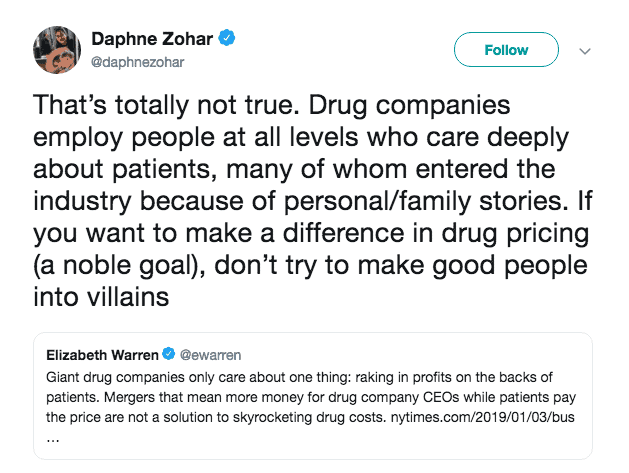
The size and significance of the $74bn acquisition of Celgene by Bristol-Myers Squibb announced last week has sparked much debate, about its implications for pharma, and what it says about the sector today.
It has also led to speculation that other companies will follow suit with multi-billion dollar deals, arriving just as the annual industry curtain-raiser, the JP Morgan Healthcare conference, gets underway in San Francisco.
One of the most notable responses to BMS’s Celgene acquisition came from US Democrat congresswoman Elizabeth Warren. The merger was unveiled last Thursday, just days after she announced her candidacy for the US Presidential elections in 2020, and Warren took to Twitter to express her view:
“Giant drug companies only care about one thing: raking in profits on the backs of patients. Mergers that mean more money for drug company CEOs while patients pay the price are not a solution to skyrocketing drug costs,” she said.
Her comments in turn sparked a heated debate on social media, with many from within the sector rushing to defend its motives and its business model.
Daphne Zohar, founder and CEO of PureTech Health was among those replying:

The fact that Warren is a senator for Massachusetts, the home of the world’s pre-eminent biopharma cluster in Cambridge was one frequently raised theme, with many biopharma employees calling on her to support rather than criticise the sector.
However there were also those pointing to what many see as Celgene’s abuse of patents and US regulations to protect Revlimid, its top-selling myeloma treatment, which earned over $8bn in 2017.
Last year the FDA added its voice to criticism of companies who exploit the system to block generic competition, with Celgene coming top of a ‘name and shame’ list.
These rows have generated uncertainty about when Revlimid will face generic competition, though Celgene have insisted this won’t be until 2022 when Natco is due to launch its generic.
However BMS chief executive Giovanni Caforio says his acquiring company is taking a more “conservative view” and predicting an earlier entrant, and insisted the acquisition is “not about Revlimid” but the five late-stage candidates Celgene has in its pipeline.
Who might be next in biopharma M&A?
Investor thoughts have naturally turned to who might be next to pull the trigger on another big M&A deal, and who might be the target.
Celgene, once the darling of the ‘big biotech’ segment, saw its share price decline 39% in 2018 thanks to a string of setbacks, and BMS took advantage of this lower market valuation to make its move.
There are one or two companies in a similar situation to Celgene, most notably Gilead (market capitalisation $88.2bn) and Biogen ($63.6bn) who may also be in the sights of big pharma companies.
Two companies mentioned as potential likely buyers in the market are AbbVie and Merck & Co.
Despite a healthy looking pipeline, AbbVie will still struggle to replace its blockbuster Humira when it loses its US patent in 2023.
Meanwhile Merck & Co has had enormous success with its immuno-oncology market leader Keytruda, but the rest of its portfolio is looking distinctly threadbare by comparison, with some investors eager for it to spend big to boost its firepower.
However, it is Lilly who has become the next to strike, today announcing that it will pay $8bn for Loxo, which recently gained approval for its new immuno-oncology treatment, Vikrakvi.




